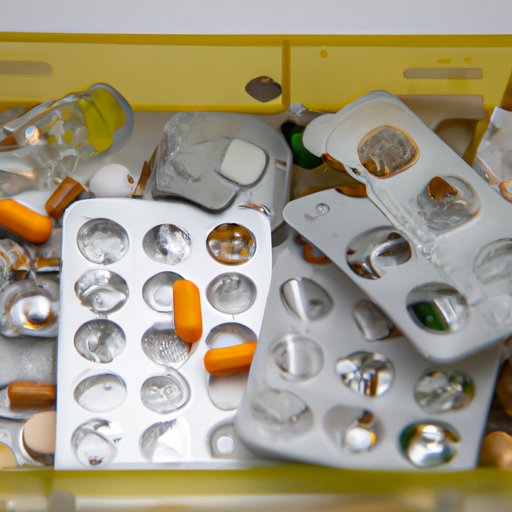
Introduction
When it comes to taking medication, checking the expiration date may not be at the top of your to-do list. However, it is important to pay attention to the shelf life of your medicine in order to ensure its safety and efficacy. Taking expired medication can lead to a variety of health risks, and can even be deadly in some cases. In this article, we will explore the risks of expired medicine, how medication expiration dates are determined, how to store and dispose of medication properly, and tips for maximizing the shelf life of your medications.
Don’t Ignore The Expiry Date: Exploring the Risks of Expired Medicine
Expired medicine can pose several risks to your health. Drugs can break down over time, which can reduce their efficacy or even make them harmful. For example, antibiotics that have expired may no longer be strong enough to fight off infections, which could result in the infection spreading and becoming worse. Using expired medication can also lead to unexpected side effects or toxic reactions, which could be serious or even life-threatening in some cases.
In addition to health risks, taking expired medication can also have financial consequences. If you take expired medication that is no longer effective, you will need to purchase new medication. Additionally, insurance companies may not cover the cost of medication that is past its expiration date.
What You Need to Know About Expiry Dates and Medications
Medicine expiration dates are determined by conducting stability tests on the drug. These tests involve storing the medication under specific conditions and then testing its potency over time. Based on the results of these tests, drug manufacturers set an expiration date for the medication. It is important to note that the expiration date only guarantees the potency and safety of the medication up until that point. After that date, the medication may become less effective or potentially unsafe to use.
There are different types of expiration dates that may be listed on medication labels. The most common is the “expiry date,” which means the medication should not be used after that date. Another common type is the “manufacture date” or “date of manufacture,” which indicates when the medication was made. This date is not an expiration date, but can be useful in determining how long the medication has been on the shelf. Some medications may also list a “beyond use date,” which is the date the pharmacy recommends that the medication be used by based on its stability and safety.
Is it Safe to Use Expired Medicine? Experts Weigh In
Medical experts advise against using expired medication whenever possible. As previously mentioned, expired medication may not be effective in treating the condition it was prescribed for, and could even be harmful. Additionally, the longer medication sits on the shelf, the more likely it is to break down and become ineffective or harmful.
There are some situations where it may be acceptable to use expired medication, but only under certain conditions. For example, in emergency situations where a life-saving medication is not available, using expired medication may be the only option. In this case, it is important to check the medication carefully for any signs of damage or deterioration, and to use it only as a last resort.
The Importance of Proper Medication Storage and Disposal
Proper medication storage is important in order to ensure the safety and efficacy of medication. Medications should be stored in a cool, dry place away from direct sunlight, and should be kept out of reach of children and pets. You should also avoid storing medication in a bathroom medicine cabinet, as the humidity and temperature fluctuations could affect the medication’s quality.
When it comes to medication disposal, it is important to follow the instructions on the label or talk to your pharmacist about the best way to dispose of the medication. Some medications should be disposed of in a certain way, such as flushing them down the toilet, while others should be brought to a medication take-back program or disposed of in the trash. Do not attempt to dispose of medication by burning it or throwing it in the trash, as this can be harmful to the environment and could potentially harm others.
Maximizing the Shelf Life of Your Medications: Tips and Guidelines
In order to maximize the shelf life of your medications, it is important to store them properly and use them according to the directions on the label. Here are some tips and guidelines for making your medication last longer:
- Store medication in a cool, dry place away from direct sunlight
- Do not store medication in a bathroom medicine cabinet
- Check medication regularly for signs of damage or deterioration, such as discoloration or a change in texture
- Use medication according to the directions on the label
- Do not crush or break medication unless advised to do so by a healthcare professional
- Do not mix medication with food or drink unless advised to do so by a healthcare professional
- Dispose of medication properly according to the instructions on the label or by talking to your pharmacist
Conclusion
Checking the expiration date on your medication may seem like a small task, but it can have a big impact on your health and well-being. Taking expired medication can be harmful or even deadly, and can also have financial consequences. By understanding how expiration dates are determined, why it is important to store and dispose of medication properly, and how to maximize the shelf life of your medications, you can ensure that you are using medication safely and effectively.
Remember to always consult your healthcare provider or pharmacist if you have any questions about your medication. By working together, you can ensure that you are getting the most out of your medication and staying healthy.





